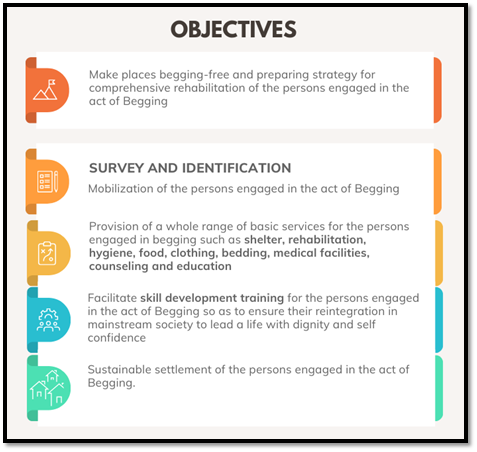Madhya Pradesh
National Workshop on SMILE-B
- 15 Jul 2025
- 3 min read
Why in News?
The Union Ministry of Social Justice and Empowerment (MoSJE) organized a National Workshop and Orientation Programme in Indore, focusing on the SMILE-B sub-scheme aimed at the comprehensive rehabilitation of persons engaged in begging.
Key Points
About SMILE-B
- It is a sub-scheme of the SMILE initiative and aims to build a ‘Bhiksha Vritti Mukt Bharat’ by facilitating the reintegration of persons engaged in begging into mainstream society with dignity and sustainable support.
- As of December 2024, the scheme has been implemented in 81 cities/towns, including major pilgrimage, historical, and tourist locations.
- The next phase aims to expand coverage to 50 additional cities.
- As of April 2025, in India, 9,958 individuals have been identified as engaged in begging.
- 970 individuals successfully rehabilitated through various scheme interventions.
- As of December 2024, the scheme has been implemented in 81 cities/towns, including major pilgrimage, historical, and tourist locations.
About National Workshop and Orientation Programme
- The event focused on rescue operations, primary rehabilitation, and livelihood convergence for persons engaged in begging.
- The workshop brought together a diverse group of participants, including State nodal officers, urban local body (ULB) representatives, NGOs, and Civil Society Groups.
- They engaged in focused discussions on challenges and best practices in implementing the SMILE-B scheme.
About SMILE Scheme
- Launched in October 2023, the SMILE Scheme (Support for Marginalized Individuals for Livelihood and Enterprise) aims to create a ‘Bhiksha Vritti Mukt Bharat’ (Begging-Free India).
- Rehabilitation Strategy:
Begging
- About: Begging involves soliciting alms through various acts like singing, selling items, or displaying deformities.
- Indore, Madhya Pradesh, has been declared India’s first beggar-free city under the Bhiksha Vriti Mukta Bharat (begging-free India) initiative.
- Status: Census 2011 reports 4.13 lakh beggars in India, with the highest numbers in Uttar Pradesh, Bihar, Maharashtra, and Madhya Pradesh.
- SECC 2011 estimates 6.62 lakh rural households depend on begging.
- Constitutional Basis: Vagrancy (includes beggary) is in the Concurrent List (Entry 15, List III), where both the Centre and the states can legislate.
- No Central Law: India lacks a uniform central law on begging, and the Bombay Prevention of Begging Act, 1959, acts as the main law that criminalizes begging and defines beggars broadly.







